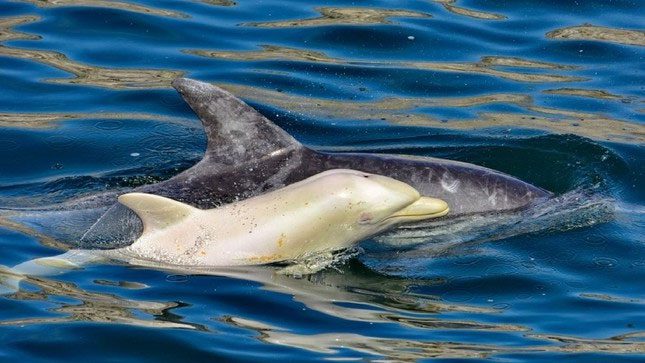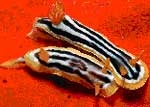Newlywed couples witnessed an extremely rare sight on their wedding day when the whale-watching boat they were on encountered an albino dolphin – possibly the first of its kind seen in Africa.
Experts suggest that this young dolphin, likely around one month old and about 1 meter long, may truly be an albino, although this is not certain based solely on images.

Albino dolphin swimming with an adult dolphin.
Albinism is a genetic condition that inhibits the production of the pigment melanin, resulting in white skin and fur. Albino animals have white coloration and pink eyes, both of which are more sensitive to light than usual.
Albinism is often confused with leucism, a condition that prevents individual cells from producing melanin. Leucistic animals may be completely white or have white patches intermixed with their normal coloration.
Erich Hoyt, a researcher at the Whale and Dolphin Conservation (WDC) in the UK and the author of the book “Encyclopedia of Whales, Dolphins, and Porpoises”, stated that the dolphin’s entirely white coloration indicates it is a true albino. However, genetic testing is the only way to confirm whether it is indeed albino.
For some animal species, being albino can significantly reduce their chances of survival. This is why albinism is very rare in the wild.
Hoyt noted that the young dolphin’s poor eyesight would not adversely affect it in later life, as dolphins use sound for communication and hunting. He added that this individual could also give birth to normally colored offspring in the future unless its partner also carries the albino gene.
In June 2017, a 3-year-old albino Risso’s dolphin (Grampus griseus) was discovered swimming with its mother in Monterey Bay, California, USA. At that time, experts stated that this dolphin was also in good health and had a high chance of survival.





















































